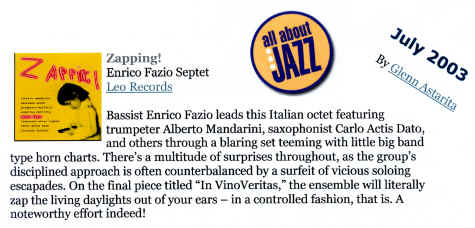Articolo disponibile solo in francese.
Enrico Fazio – Zapping
Guide CDs 2004/Chroniques – Spécial 2004 – Supplément disques au n° 606 – décembre 2003/janvier 2004
Sette, Wake Up, Walkabout, Ciao Jack, Kitsch, Igor, Aria pura, Libellula obesa, In vino veritas
Alberto Mandarini (tp, flh), Fabrizzio Bosso (tp, flh), Gianpiero Malfatto (tb, tba, fl), Angelina Perrotta (vln, clav), Francesco Aroni Vigone (s), Carlo Actis Dato (s, cl), Enrico Fazio (b), Florenzo Sordini (dm, perc) Enregistré les 17 et 18 juin 2001 et les 29 et 30 avril 2002 à Calliano (Italie) Durée : 1h 15’ 37’’ – Leo Records 372 (Orkhêstra International).
Enrico Fazio nous avertit : « J’ai pris des centaines d’exemples musicaux de nombreux styles de musiques et je les ai réutilisés hors de leur contexte en une sorte de zapping musical.
En même temps j’ai essayé de préserver mon propre style et l’unité du projet dans un équilibre entre compositions et improvisations.
« Disons-le tout de suite , aussi étrange que cela puisse paraître, le résultat est assez emballant.
L’ensemble fonctionne comme une fanfare, un brass-band, hommage à la tradition néoorléanaise, d’ailleurs le thème «Igor» est plus qu’un clin d’oeil au new-orleans, puisqu’il reprend «Tiger Rag» assez traditionnel, et le déstructure, le reconstruit dans un décalage décapant et enthousiasmant. Il ne s’agit pas de bricolage au sampler mais bien de compositions de Fazio, et son système, décrit assez précisément sur le livret, mérite qu’on s’y intéresse en ces temps de collages musicaux, car il semble bien qu’il y ait là une voie qui permette de s’exprimer. En fait peu importe la technique de création, ce qui compte c’est le résultat. Et ici il est de qualité. Certes le brassband est parfois un peu lourd rythmiquement, mais les solos sont si nombreux et si bons que ça passe bien. Ajoutons la présence de l’excellent Carlo Actis Dato qui ajoute son talent à l’ensemble comme par exemple, au sax ténor, sur «Walkabout», et à la clarinette basse sur « In vino veritas » qui représente un condensé de la mémoire musicale de Fazio. Les musiciens italiens font bouger le jazz depuis quelque temps.
Serge Baudot
